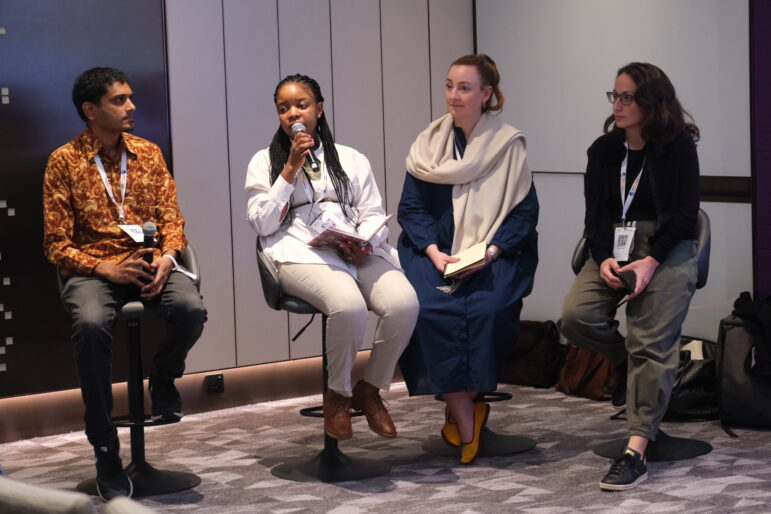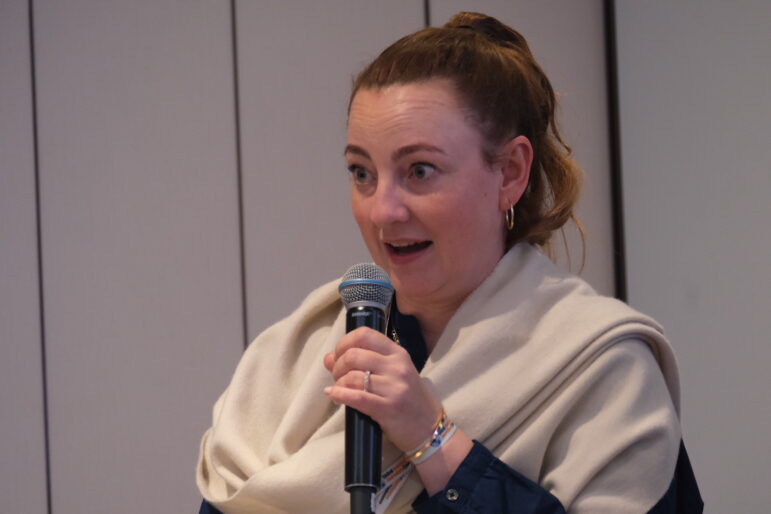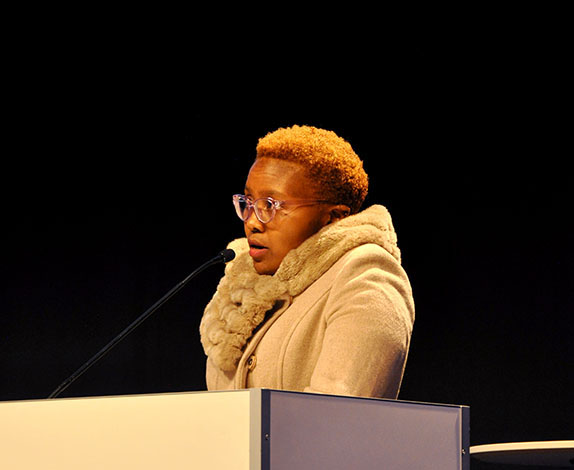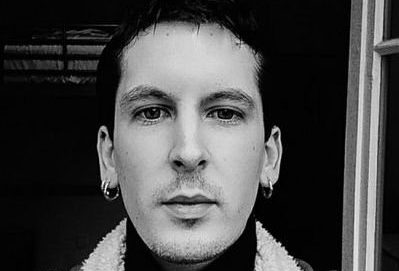

Speakers at the "Conducting Investigations as a Freelancer" panel at GIJC25. Image: Alyaa Abdul Aziz Alhadjri for GIJN
Best Reporting and Business Practices for Freelance Investigative Journalists
Managing a career as a freelance investigative journalist is like captaining a small, independent vessel in an unpredictable sea. Freelancers must not only focus on charting the course of an investigation, but also be the ship’s owner and crew — from accountant and mechanic, to insurance agent and safety officer.
Speaking at “Conducting Investigations as a Freelancer” session at the 14th Global Investigative Journalism Conference (GIJC25) in Malaysia, Sylke Gruhnwald, a Swiss investigative reporter who left a staff position and went freelance in 2020, said she had expected the biggest challenge of freelancing to be finding stories. She has realized, however, that “freelancing isn’t just about stories but surviving between them.”
Zimbabwean investigative journalist Linda Mujuru said staff journalists in her country are typically poorly paid. Freelancing offers flexibility — she is able to negotiate her fee with multiple newsrooms and maximize her expertise as a local journalist with specialist knowledge.
For every challenge of freelancing, there is a perk. “Everything [in freelance journalism] is a trade-off,” added Nithin Coca, a Japan-based, Asia-focused freelance journalist.
The veteran freelancers shared a range of practical tips — from managing burnout to pitching and organizing investigations — for anyone trying to build a long-term freelance career.
You Are the Newsroom — And the Business
Freelancers must think like business owners to keep the lights on in their newsrooms-of-one — even if that’s the lights in a corner of their living room. The speakers urged freelancers to itemize every cost in their budgets for stories, including time required for administrative tasks or travel expenses.
Freelance investigative journalists must track the time and money required to do their job and run their businesses. Time spent writing invoices, drafting pitches, chasing money, revising work, and fact-checking should be accounted for when negotiating rates or setting budgets. Equipment, software, and other operating costs should also be factored in.
“Your day rate must cover not just the writing time, but the admin work as well,” said Gruhnwald.
Gruhnwald explained that she had created a limited liability company (LLC), where she is the only employee, to protect her from being personally liable when investigations are published and to create a more formal, salaried arrangement.
Not every freelancer works in countries where their work is adequately valued or where they can pitch a budget for a project, however. In these contexts, it becomes even more critical for freelancers to understand their financial worth and target international media that can pay better rates, said Mujuru.
“You can get paid, but you need to make sure you’re approaching the right organizations,” she said. “Learn to say no, because if you accept everything and anything, people will take advantage.”
Negotiate Everything
Each speaker had stories of having to chase payments, renegotiate unexpected edits, or insist on the addition of a kill fee. For investigative projects, a per-word rate of pay isn’t enough, said Gruhnwald. She sends a detailed spreadsheet capturing all anticipated costs to editors.
For grant-funded work, the newsroom publishing your investigation still needs to pay you, added Coca: “Editors do try to trick journalists into taking less money just because you have the grant. They shouldn’t, and we should stand up against that.”
Build Alliances
Freelancing is often viewed as a solitary profession, but the most impactful investigations today are rarely produced solo. Working with partners or in teams can enable reporters and their investigations to reach sources, places, or communities they could never access alone, said Coca.
Mujuru said she is part of a group of women journalists in Zimbabwe who might share contacts, but more often provide emotional support. In the same vein, where journalist unions exist, freelancers should join them, urged Gruhnwald. In Switzerland, for example, union membership includes access to legal counsel. Where unions don’t exist, freelancers should consider creating their own, she added.
Safety Is Digital, Legal, and Physical
Safety — whether digital, legal, or physical — is a “do it yourself” necessity for freelance investigative journalists, said Mujuru. It’s crucial to clear your digital footprints and frequently check if passwords have been compromised.
She recommended tools such as VeraCrypt or Cryptomator to encrypt sensitive data; Bitwarden or 1Password for password management; and enabling two-factor authentication everywhere. Dedicated devices for work are also important.
Mujuru notifies her husband and another journalist of her movements every two hours when she is in the field and encourages freelancers to have trusted people with which to check in. She keeps a media lawyer on speed dial and never posts real-time updates from the field on social media.
Insurance is non-negotiable, added Gruhnwald: “Health insurance, equipment insurance, legal insurance — get them all — and always get written confirmation that your travel insurance covers crisis regions.”
Never Sign a Contract that Shifts Liability to You
Perhaps the most urgent advice from the session — protect yourself legally.
If a newsroom contract includes clauses that shift legal liability onto the freelancer — from defamation risks to lawsuits triggered by investigations — don’t accept such terms, the panelists warned. “If a contract pushes liability onto you, walk away,” advised Gruhnwald. “You need a healthy environment that keeps you safe legally, financially, and emotionally.”
She pointed reporters to tools such as Freelance Investigative Reporters and Editors’ (FIRE) contract template. If an editor refuses to negotiate on unreasonable clauses, it’s a red flag and a reason to leave, she added.
Diversify Your Income
Income from freelance investigations can be slow, low, and unreliable. The speakers encouraged freelancers to develop other income sources to supplement their work without shame or hesitation.
Gruhnwald teaches at two art schools, creates investigative theater productions, and gives paid talks. “These activities subsidize my journalism,” she said. “They add income, visibility, and sometimes new collaborators.”
Mujuru, meanwhile, is a farmer, growing maize and raising chickens. It’s not glamorous, she said, but it keeps her liquid during slow periods or between commissions.
“Grant funding is really important as a freelancer,” Coca added. “The challenge is that a lot of grants only fund the reporting process.” Smaller or less well-known grants may get fewer submissions, so look out for and target those, he said.’

Swiss freelance journalist Sylke Gruhnwald noted that freelance investigative reporters should make sure they protect themselves legally. Image: Alyaa Abdul Aziz Alhadjri for GIJN
Protect Your Mental Health
When you are freelance, there’s no office to leave, no clock to punch in or out, and no manager insisting you take a weekend off. Overwork and burnout are significant risks.
Mujuru spoke candidly about the psychological toll of pitching and rejection. To stay grounded, she builds a daily routine and sets strict working hours. She uses to-do lists to prevent burnout and sets boundaries with editors to avoid midnight messages expecting instant replies.
“You must let editors know when you are not available, otherwise they’ll assume you are always available,” she said.
Gruhnwald added that freelancers must schedule time off deliberately: “Burnout is not a badge of honor. No story is worth emotional damage.”









